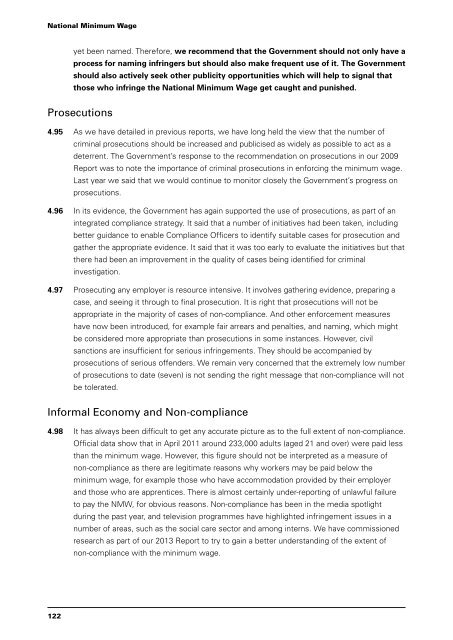National Minimum Wage
National Minimum Wage
National Minimum Wage
You also want an ePaper? Increase the reach of your titles
YUMPU automatically turns print PDFs into web optimized ePapers that Google loves.
<strong>National</strong> <strong>Minimum</strong> <strong>Wage</strong><br />
122<br />
yet been named. Therefore, we recommend that the Government should not only have a<br />
process for naming infringers but should also make frequent use of it. The Government<br />
should also actively seek other publicity opportunities which will help to signal that<br />
those who infringe the <strong>National</strong> <strong>Minimum</strong> <strong>Wage</strong> get caught and punished.<br />
Prosecutions<br />
4.95 As we have detailed in previous reports, we have long held the view that the number of<br />
criminal prosecutions should be increased and publicised as widely as possible to act as a<br />
deterrent. The Government’s response to the recommendation on prosecutions in our 2009<br />
Report was to note the importance of criminal prosecutions in enforcing the minimum wage.<br />
Last year we said that we would continue to monitor closely the Government’s progress on<br />
prosecutions.<br />
4.96 In its evidence, the Government has again supported the use of prosecutions, as part of an<br />
integrated compliance strategy. It said that a number of initiatives had been taken, including<br />
better guidance to enable Compliance Officers to identify suitable cases for prosecution and<br />
gather the appropriate evidence. It said that it was too early to evaluate the initiatives but that<br />
there had been an improvement in the quality of cases being identified for criminal<br />
investigation.<br />
4.97 Prosecuting any employer is resource intensive. It involves gathering evidence, preparing a<br />
case, and seeing it through to final prosecution. It is right that prosecutions will not be<br />
appropriate in the majority of cases of non-compliance. And other enforcement measures<br />
have now been introduced, for example fair arrears and penalties, and naming, which might<br />
be considered more appropriate than prosecutions in some instances. However, civil<br />
sanctions are insufficient for serious infringements. They should be accompanied by<br />
prosecutions of serious offenders. We remain very concerned that the extremely low number<br />
of prosecutions to date (seven) is not sending the right message that non-compliance will not<br />
be tolerated.<br />
Informal Economy and Non-compliance<br />
4.98 It has always been difficult to get any accurate picture as to the full extent of non-compliance.<br />
Official data show that in April 2011 around 233,000 adults (aged 21 and over) were paid less<br />
than the minimum wage. However, this figure should not be interpreted as a measure of<br />
non-compliance as there are legitimate reasons why workers may be paid below the<br />
minimum wage, for example those who have accommodation provided by their employer<br />
and those who are apprentices. There is almost certainly under-reporting of unlawful failure<br />
to pay the NMW, for obvious reasons. Non-compliance has been in the media spotlight<br />
during the past year, and television programmes have highlighted infringement issues in a<br />
number of areas, such as the social care sector and among interns. We have commissioned<br />
research as part of our 2013 Report to try to gain a better understanding of the extent of<br />
non-compliance with the minimum wage.


